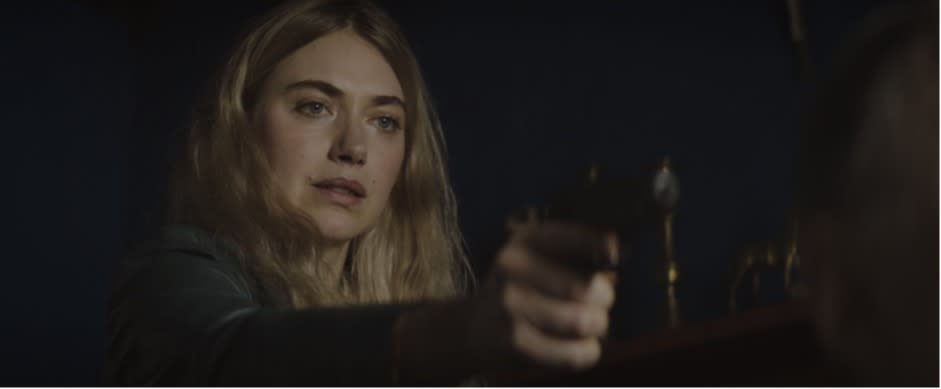‘Baltimore’ Review: Imogen Poots Carries a True-Life Marxist Art Heist Film

Rose Dugdale has the kind of life story where, if she didn’t happen to be a Marxist, it would feel tailor-made for a Hollywood film. The heiress of a millionaire English family, Dugdale was born into an easy life: finishing school, debutante balls, and a place in the rarefied halls of Oxford. But Dugdale rejected the wealth handed to her and, after an incident in which she attempted to steal 82,000 pounds worth of silverware and paintings from her parents’ estate, left England to become a member and leader in the Irish Republican Army, fighting to end British rule of Northern Ireland.
“Baltimore,” a new feature film starring Imogen Poots as Dugdale, occasionally jumps somewhat awkwardly through this woman’s path to radicalization, but the film, from writer, director, and editor duo Christine Molloy and Joe Lawlor, largely anchors itself on the nine-day sliver of time she’s most notorious for. The film opens on Poots — in a red wig and smeared on makeup — lying motionless on the floor of a large estate, her hand covered in a bloody wrap. The sense of danger the image conveys proves an entertaining fake-out, as she quickly gets up and strides triumphantly out of the manor, where she leads us into what the opening titles refer to as the “largest art theft in history.”
More from IndieWire
It’s April 26, 1974, and Rose and her team of three IRA volunteers have just stormed their way into Russborough House, the Irish estate of English nobleman Alfred Beit (John Kavanagh). From the palatial home, the quartet stole 19 paintings from master artists like Peter Rubens and Johannes Vermeer. While Rose’s lover Eddie Gallagher (Jack Meade) heads off for their safe house in Baltimore (the small village in Southern Ireland, not the Maryland city), she and two accomplices Dominic and Martin (Tom Vaughan-Lawlor and Lewis Brophy, both playing stand-ins for IRA members who were never caught or identified) hole up in the seaside village of Glandore for a week with the paintings hidden in a rental cottage. Periodically, Rose heads to the local pub, where she puts on an amusingly ridiculous French accent and calls Ireland’s National Gallery of Art, demanding the release of several IRA members and political prisoners in exchange for the safe return of the paintings.
Most effective as a straightforward thriller, “Baltimore” plays a bit like a version of “Reservoir Dogs” where we actually see the heist, cutting between the raid on the home and the immediate aftermath, as Rose attempts to keep her head down and avoid authorities looking for her and her comrades. The home invasion scenes suffer slightly from this cross-cut approach, sapping momentum from the group’s efforts to detain Beit’s family and his large staff of servants.
Thankfully, the story mostly rests on the period afterwards, where a restless Rose slowly grows consumed by paranoia and doubt. A few unnecessary scenes try and fail to add depth or texture to the largely anonymous Dominic and Martin, but they’re quickly scuttled off to Baltimore, leaving Rose — pregnant with a child by Gallagher — to evade the suspicions of the locals on her own.
As rendered by the film and by Poots’ layered performance, Rose is a woman consumed by her calling, as true a believer in the power of radical action as anyone can be, but also an empathetic person with a gnawing guilt regarding the ugly necessities of her work. She’s perfectly willing to threaten a family and tie up a child, but their bloody faces will appear in her nightmares afterwards.

Poots threads that needle well, never overtipping Rose’s vulnerabilities, but making them clearly legible to the audience, and the film is most engrossing when it allows her to showcase that inner turmoil. A standout sequence focuses on her fears that elderly neighbor Donal (Dermot Crowley) has her figured out, and seriously contemplates shooting him dead if it will buy her time. Visiting him with a hidden pistol, she’s charming and lively, before retreating into the bathroom where she attempts to steel herself into pulling the trigger. Molloy and Lawlor, aided by a sparse but menacing score from composer Stephen McKeon, direct these sequences smoothly, building the tension that threatens to snap Rose at any moment.
It’s when the film expands outside of this moment in her life that it begins to falter. Perhaps Rose’s journey to political radicalization is simply less interesting than the actions she takes when she gets there, but the film also isn’t able to tell that story cleanly. The opening sequence, featuring overwritten narration from Poots that mercifully disappears for the rest of the movie, briefly covers Rose’s childhood, positioning her as a rebel from birth that disapproved of fox-hunting and turned her nose at the idea of visiting Buckingham Palace.
That’s likely accurate to the real Dugdale, but it renders future flashback scenes that flit through her time at Oxford and nascent political activity largely redundant, and the movie never pins down or conveys her growth as a radical. From a pacing perspective, most of the flashbacks feel randomly slotted in to the narrative, with little relation to what’s happening within the driving storyline.
The film also strains when it aims to say anything about art; the paintings work best simply as plot devices, or symbols of the wealth and inequity Rose has dedicated her life to destroying. But the script somewhat halfheartedly adds a throughline about her relationship with art over the course of her life, and particularly the stolen Vermeer, “Lady Writing a Letter with Her Maid.” A portrait of a woman and. a housemaid, its a perfect stand-in for the themes of class and inequity the movie’s dealing with. But Rose’s musings on the meaning of the piece, and fleeting suggestions that she’s developing an emotional attachment to the stolen art on whole, don’t quite ring true to who she is, or at least who she is as seen in the film.
“Baltimore” ultimately hinges on Poots to do most of the heavy work, and the consistently great actor is magnetic in the role, nervy and vulnerable but with a clear-eyed belief in her own convictions that makes her pop off the screen. If the movie isn’t ever quite able to inspire the same devotion from the audience that Rose Dugdale has for her cause, watching a protagonist as compelling as her still makes for a thrilling 90 minutes and change.
Rating: B-
“Baltimore” premiered at the 2023 Telluride Film Festival. It is currently seeking U.S. distribution.
Best of IndieWire
Sign up for Indiewire's Newsletter. For the latest news, follow us on Facebook, Twitter, and Instagram.
